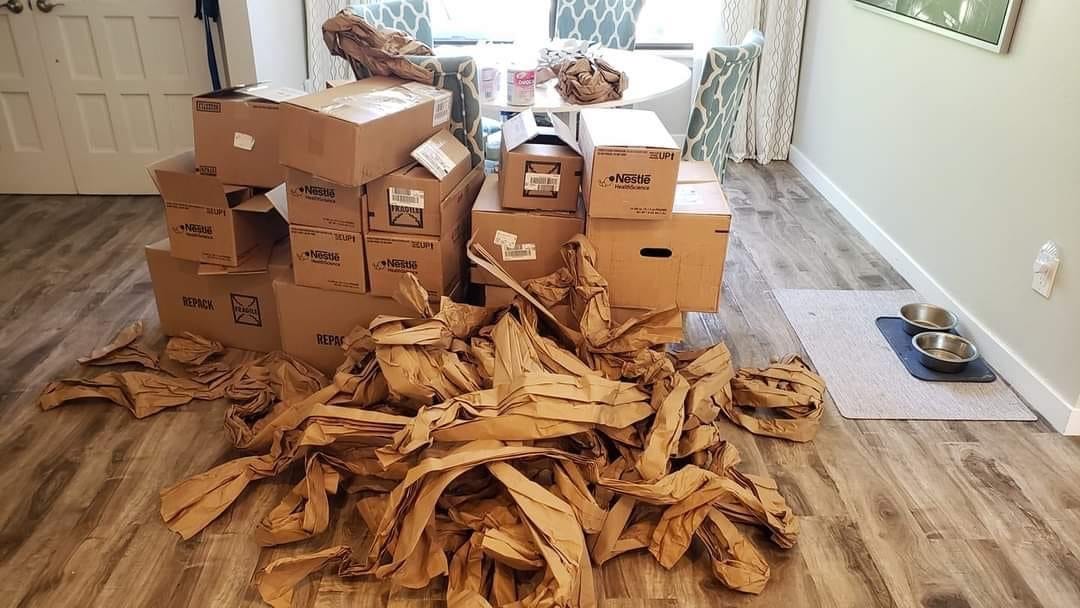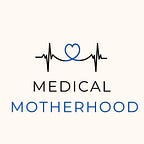
Each week, we showcase a picture of real life from the Medical Motherhood community. If you’d like to participate, simply reply to this email and attach your pictures. The intent is to show YOUR experience as a medical parent, not your child. What do you want people to know about the #medicalmom (or #medicaldad!) life?
Medical Motherhood’s news round up
Snippets of news and opinion from outlets around the world. Click the links for the full story.
• From AP News: “Families worry over the future of Medicaid caregiver payments that were expanded during the pandemic”
Nathan Hill started receiving $12.75 an hour from a state Medicaid program to help care for his severely disabled son during the pandemic, money he said allowed his family to stop using food stamps.
The program was designed to provide a continuation of care and ease a home health worker shortage that grew worse after COVID-19 hit.
But now, with the COVID-19 public health emergency over, he worries that the extra income will disappear. Some states have already stopped payments while others have yet to make them permanent.
“The success of this during the pandemic was tremendous … for the first time we were able to pay our own way,” said the Meridian, Idaho, resident. “We’re not relying on charities to help us pay our rent and utilities.”
[…] States found that being flexible with caregiver payments helped keep residents served during the pandemic, said Kate McEvoy, executive director of the National Association of Medicaid Directors. She said surveys have shown, too, that people generally like receiving care from family members.
But she also noted that there are concerns both nationally and at a state level about the potential for fraud when paying family members as opposed to an agency that may be subject to more oversight. States also want to make sure that any family caregivers are trained properly and provide quality care.
[…] “You provide better services to someone you love and care about,” said [Holly] Carmichael, whose daughter was born with a rare congenital disease. “They’re part of your life versus a job.”
Carmichael’s [financial services] firm helps people do background checks on potential caregivers and then does payroll, tax withholdings and other paperwork once they are hired.
She said it makes no sense to end payments to family caregivers.
“We have a shortage of caregivers in our country,” Carmichael said. “We need to be pulling every lever we can.”
• From Valley News (New Hampshire): “Summer camps for children with special needs in short supply”
[…] It was a Tuesday morning earlier this summer at Camp Aspire, a free, one-of-a-kind summer camp for children ages 6 to 16 with special needs run by the Special Needs Support Center (SNSC), a White River Junction-based nonprofit organization that assists families in the Upper Valley [of New Hampshire]. The Special Needs Support Center is primarily funded by grants and donations.
Within a week of opening for registration in January, the 14 slots for each week of Camp Aspire filled up, said [Emma] Woloshin, who leads Camp Aspire as part of her role as youth program services coordinator at SNSC. This year, it runs for one week in June and two weeks in August. During July, many Camp Aspire participants attend summer school programs in their home districts.
“It is a huge issue in the community and how fast our camp filled up is a testament to the need,” Woloshin said in a May phone interview. “I wish there was more we could do. We’re definitely trying, but the need is so big.”
[Mom Annie] Hoen noted that [finding a camp for her disabled son] is a stark contrast from finding camp programs for her 11-year-old [abled-bodied] daughter.
“It’s sort of alarming how when you have a child who is disabled or has extra health care needs, how narrow the options are compared with what’s already really kind of a tricky situation, trying to find care for young school-aged kids,” she said.
[…]Ideally, parents said, there would be more programs like Camp Aspire and more funding to pay for one-on-one aides at traditional camp programs. There would also be more programs that work for children with mobility devices and transportation to help campers get where they need to go.
“I would just wish that there were enough camp opportunities that every child who wants to go to camp or every family that has a need for camp in the summer could be included,” Hoen said.
• From the American Academy of Pediatrics (news release): “AAP to Create National Center for System of Services for Children With Special Health Care Needs”
ITASCA, IL — The Health Resources and Services Administration’s Maternal and Child Health Bureau has awarded the American Academy of Pediatrics (AAP) a $7.5 million cooperative agreement to form a new national center for a system of services for children and youth with special health care needs (CYSHCN). The project [started] in July.
With the five-year cooperative agreement, the AAP will establish a National Center Consortium (NCC) with Boston University, Family Voices, and The National Alliance to Advance Adolescent Health. The goal of the collaboration is to provide better care for more children and youth with special health care needs by supporting the implementation of the MCHB Blueprint for Change: Guiding Principles for a System of Services for CYSHCN.
[…]The systemic barriers facing children and youth with special health care needs and their families are long-standing and underscore the need for new approaches to advance the system of services. The AAP and its partners are committed to transforming and improving the systems of services for CYSHCN and their families through the NCC and subsequent national center.
See Medical Motherhood’s story from last year on the Blueprint for Change:
Medical Motherhood brings you quality news and information each Sunday for raising disabled and neurodivergent children. Get it delivered to your inbox each week or give a gift subscription. Subscriptions are free, with optional tiers of support. Thank you to our paid subscribers!
Follow Medical Motherhood on Facebook, Twitter, TikTok, Instagram or Pinterest. The podcast is also available in your feeds on Spotify and Apple Podcasts. Visit the Medical Motherhood merchandise store.












